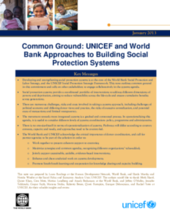The recently released UNICEF Social Protection Strategic Framework and the World Bank Social Protection and Labor strategy call for taking a systems approach to social protection as a way to help countries, communities, families and children enhance resilience, equity and opportunity. This brief outlines the common ground between the World Bank and UNICEF in their commitment in developing and strengthening social protection systems, and calls on other stakeholders to engage collaboratively to build such systems and expand their coverage.
The brief explains the rationale behind a system’s approach to social protection, which aims to provide coordinated and harmonized response to the multi-dimensional vulnerabilities across the life-cycle. In general terms this entails a portfolio of interventions which address social and economic vulnerabilities using both short-term interventions to address temporary shocks and longer-term approaches to address structural vulnerabilities and chronic poverty. The rationale for taking this approach is further enhanced when assessed through a child lens. Social protection can serve as an effective catalyst for a range of multi-sector investments needed to address children's multiple needs, including investments in child protection, education, cognitive development, nutrition and health. A systems approach also speaks to the flexibility needed to respond during critical periods in a child's development, and to the need to invest early to gain efficiencies given that early childhood investments generate high rates of return. Acknowledging that a system’s approach to social protection also comes with a number of risks, challenges and costs, it cautions that the movement towards more integrated systems is a gradual and contextual process. The brief suggests ways a system’s approach can be operationalized at policy, program, and administrative levels, keeping in mind the varying context, capacity, and needs of each country.
Lastly, the World Bank and UNICEF call for partner agencies to be part of the solution and work together to present coherent support to countries, maximize synergies and common agenda, jointly support sustainable, scalable, evidence-based interventions, enhance and share analytical work on systems development, and promote cooperation for knowledge sharing and capacity building.
©World Bank and UNICEF

